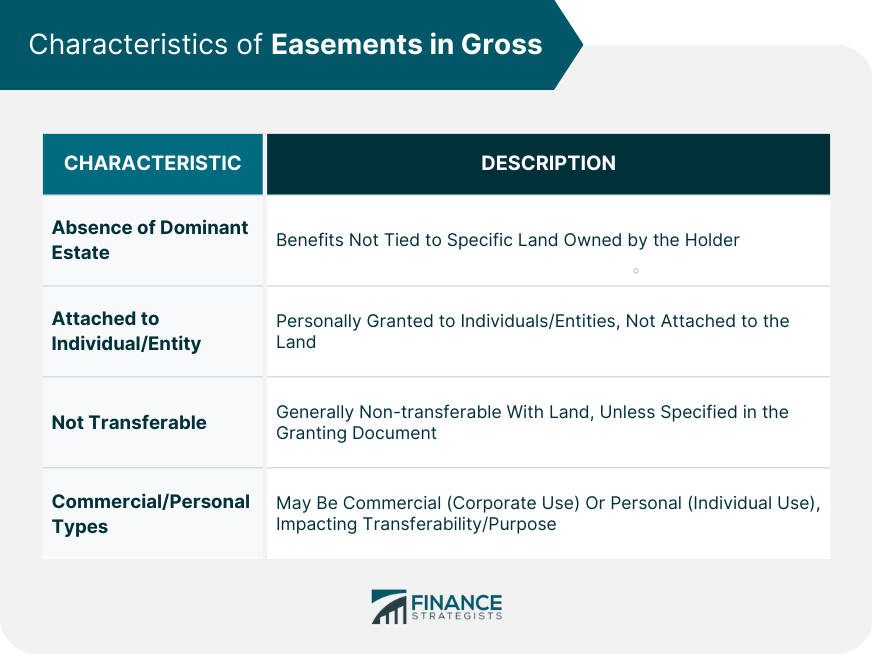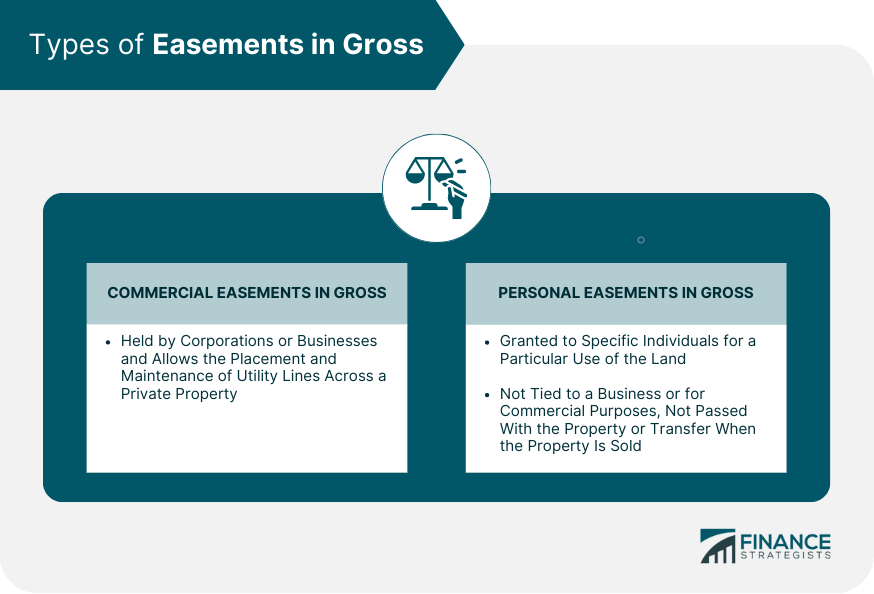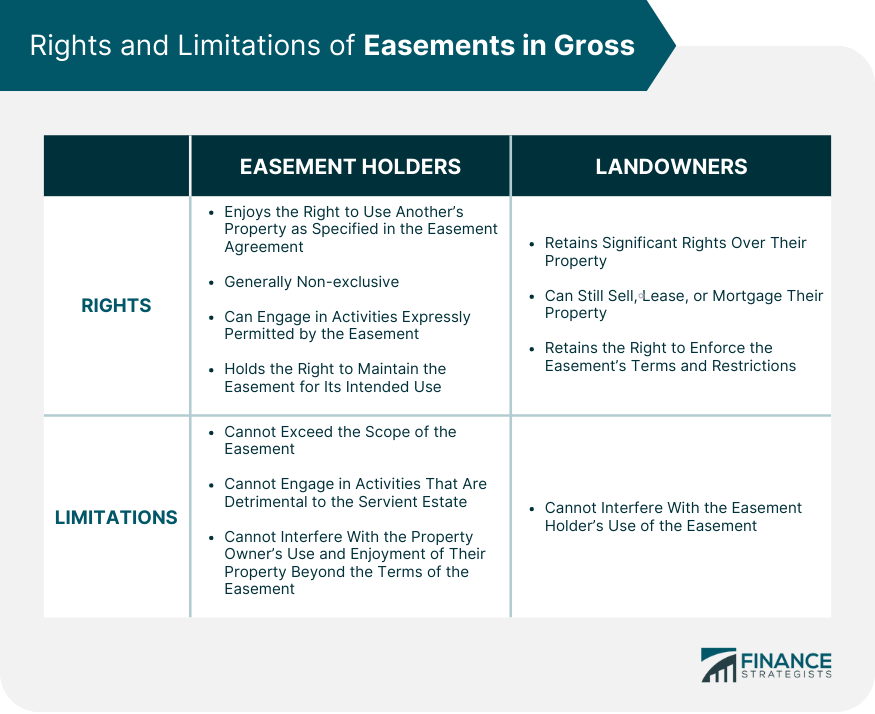An easement in gross is a legal right bestowed upon an individual or an entity to utilize another person's property, without having the ownership of that property. Unlike common easements, it isn’t associated with any adjoining parcel of land owned by the easement holder. Instead, it’s a personal right that gives the holder access to or use of the land in question. The crux of this concept hinges on the use of property without possession. To put it in a simple context, imagine a power company that has been granted the right to run power lines across a particular piece of land. The power company does not own the land, but has been granted an easement in gross to use it for a specific purpose. Easement in gross carries substantial importance in the real estate realm, especially in scenarios where property access is crucial yet ownership isn't feasible or necessary. This legal provision allows certain parties, typically utility companies, but also potentially individuals, to gain access to land for a specific purpose, such as installing utility lines, pipelines, or cable TV lines. Furthermore, understanding easements in gross is essential when buying or selling a property as it may impact property value, use, and development potential. For instance, an easement in gross may limit a property owner's ability to construct on certain areas of the land, thereby affecting the property's potential for development. In a typical easement scenario, there exists a dominant estate (the property that benefits from the easement) and a servient estate (the property that is subjected to the easement). However, an easement in gross operates differently. An easement in gross arises independently of any land owned by the holder of the easement. It's a personal right accorded to an individual or entity, and its benefits do not attach to any specific land that the individual or entity may own. This distinction means that there is no "dominant" estate that benefits from the easement. Instead, the individual or entity that holds the easement right benefits personally. Another salient characteristic of easement in gross is its attachment to an individual or entity, not the land. Unlike typical easements that are tied to specific properties, an easement in gross is unique as it is personally bestowed upon an individual or an entity. In essence, the easement in gross moves with the individual or entity that holds it, and not with the land. This characteristic manifests when the property changes hands. While common easements usually transfer with the property, an easement in gross does not, unless explicitly specified in the granting document. Easement in gross is usually non-transferable, which means that when the property changes ownership, the easement does not automatically pass on to the new owner. However, the specifics of transferability can depend on the nature of the easement. It's important to understand that this characteristic is not universal. In some cases, commercial easements in gross can be transferred, especially if it's stipulated in the original agreement. Nevertheless, the general principle is that the easement is tied to the individual or entity and not the property itself. Easements in gross can also be distinguished based on their nature: they may be commercial or personal. A commercial easement in gross usually involves a corporation or company and often concerns utilities. The power line example mentioned earlier falls under this category. Conversely, a personal easement in gross is linked to an individual for non-commercial use. An example could be an easement that permits a neighbor to use a path through another's property. This differentiation is crucial as it often determines transferability, with commercial easements being generally transferable while personal ones are not. Commercial easements in gross often form the cornerstone of public utility infrastructure, such as electricity, water supply, and gas lines. These easements are held by corporations or businesses and allow the placement and maintenance of utility lines across a private property. Such easements are critical for infrastructure development and service provision in society. For instance, without commercial easements in gross, it would be challenging for utility companies to provide necessary services like power, water, and communication networks. Moreover, these easements are usually transferable with the business, allowing for continuous service regardless of changes in business ownership. On the other hand, personal easements in gross are granted to specific individuals for a particular use of the land. They aren't tied to a business or for commercial purposes, and they don't pass with the property or transfer when the property is sold. For instance, one might grant a neighbor the right to use a path through their land to access a public beach. The personal nature of these easements means they are often non-transferable. However, it's essential to note that each easement is dictated by its particular terms. Therefore, it's critical to review any easement documents to understand the rights and restrictions thoroughly. Easements in gross can be established in several ways, one of which is through an express grant. An express grant is a formal, written agreement in which the property owner gives someone else the right to use a portion of their property for a specific purpose. In the context of an easement in gross, the express grant would clearly define the right of the individual or entity to use the property, and it would be recorded in the property’s deed or a separate legal document. The terms of this express grant would stipulate the rights, limitations, and responsibilities of both the grantor (property owner) and grantee (easement holder). Easement in gross can also be created by implied grant. An implied easement is not explicitly stated in a written document, but is inferred from the actions and circumstances of the parties involved. Courts may determine an implied easement has been created based on the necessity or past use of the property. For instance, if a neighbor has been using a path through a property for many years without objection, a court may determine that an implied easement in gross exists. However, establishing an easement by implication can be a complex process requiring substantial legal expertise. Prescriptive easements are similar to adverse possession, often colloquially referred to as "squatter's rights". A prescriptive easement in gross can be established if a person has been using a part of another's property openly, continuously, and without the owner's consent for a certain period defined by state law. Although this may seem a contentious way to establish an easement, it is fairly common. For example, if a person has been using a trail through another's property to reach a public park for many years without being stopped or asked to stop by the property owner, they may be able to claim a prescriptive easement. An easement in gross may also be established by necessity. This typically happens when a piece of land is landlocked without any access to a public road. In such instances, the courts may grant an easement by necessity over the neighboring land to provide access to the landlocked parcel. However, the easement by necessity is usually extinguished once the necessity ends. For instance, if a public road is later built to reach the landlocked property, the easement may be terminated. The holder of an easement in gross enjoys the right to use another's property as specified in the easement agreement. This right is generally non-exclusive, meaning the property owner also retains rights to the property. Easement holders can engage in activities expressly permitted by the easement, like crossing the property, installing utility lines, or fishing in a private pond. They also hold the right to maintain the easement for its intended use. For instance, a utility company with an easement for power lines can trim or remove trees that may interfere with the lines. While easement holders have certain rights, they are also subject to limitations. An easement holder cannot exceed the scope of the easement. If the easement specifies a particular path through the property, for instance, the holder cannot deviate from that path. Moreover, the holder cannot engage in activities that are detrimental to the servient estate. They also cannot interfere with the property owner's use and enjoyment of their property beyond the terms of the easement. Violations of these limitations may result in legal consequences. Despite granting an easement in gross, the landowner retains significant rights over their property. The landowner continues to own the property and can use it as they wish, as long as it doesn't interfere with the easement holder's rights. In the context of an easement in gross, the landowner can still sell, lease, or mortgage their property. However, any new owner or lessee must respect the existing easement in gross. The landowner also retains the right to enforce the easement's terms and restrictions. While the landowner retains rights over their property, they are subject to certain limitations after granting an easement in gross. Primarily, the landowner cannot interfere with the easement holder's use of the easement. This means the landowner cannot obstruct or prevent the easement holder from exercising their rights under the easement. For instance, if the easement permits a neighbor to cross the property along a specific path, the landowner cannot build a fence that blocks this path. Violating these limitations can result in legal action by the easement holder. One way an easement in gross may be terminated is through an agreement between the parties. If both the easement holder and the landowner agree that the easement is no longer necessary or desirable, they can jointly decide to terminate the easement. This agreement should be in writing and ideally recorded in the same public records where the easement was initially recorded. This helps to avoid future misunderstandings or disputes about the property rights. While the concept of dominant and servient estates does not typically apply to an easement in gross, there might be instances where the easement holder acquires the servient estate. In such cases, the easement may terminate through a legal concept called merger, which occurs when the same person comes to own both the easement and the property. Another way an easement in gross may terminate is through abandonment. If the easement holder stops using the easement and displays an intent to permanently abandon their rights, the easement may end. However, non-use of the easement by itself may not constitute abandonment. There generally needs to be some act demonstrating the intention to abandon the easement. In some jurisdictions, prolonged non-use of an easement in gross can lead to its termination. This does not mean occasional or temporary disuse, but a prolonged period of non-use that may vary from state to state. However, this rule isn't universal and depends on the specific laws of each jurisdiction. If an easement in gross was granted for a specific period, it would naturally terminate when that period expires. For instance, if an easement was granted for ten years, it will automatically end after ten years. Similarly, an easement granted for the lifespan of the holder would end when the holder passes away. The distinction between easement in gross and appurtenant easement is a significant consideration in real estate law. Unlike an easement in gross, an appurtenant easement is attached to the land, not the individual. This means that the easement benefits the property (dominant estate) and passes with the property when it is sold or transferred. Understanding the difference is vital as it affects the transferability of the easement, its impact on property value, and its effect on future land use. Legal disputes often arise when there is confusion or disagreement over whether an easement is in gross or appurtenant. Encroachments and interferences can also be a source of legal disputes surrounding easements in gross. An encroachment occurs when the easement holder exceeds the scope of their easement, for example, by building a structure on the servient property. Interference, on the other hand, occurs when the property owner obstructs or prevents the easement holder from using their easement. These situations can lead to conflicts and may require legal action to resolve. Both easement holders and property owners should be mindful of their rights and responsibilities to avoid such disputes. Eminent domain refers to the power of the government to take private property for public use, with compensation to the property owner. In some cases, the government may exercise eminent domain to establish an easement in gross, particularly for utilities and infrastructure. This intersection of eminent domain and easement in gross can raise complex legal issues. Property owners who face a potential taking of their property through eminent domain should consult with an experienced attorney to understand their rights and potential compensation. An Easement in gross grants an individual or an entity the right to use another's property without possessing it. It often plays a vital role in areas like utilities and access rights. Whether for a power company laying lines across private land, or a neighbor having access through another's property, understanding this concept is integral to grasping property rights and land use. From its independence from a dominant estate, its attachment to an individual or entity, its generally non-transferable nature, to its potential commercial or personal usage, these attributes shape the essence of easement in gross. Easement in gross holds significant importance in real estate, often acting as a balancing factor in the nuanced dynamics of property rights. It's a testament to the legal system's ability to harmonize the rights of individual landowners with societal needs. It's the law's acknowledgement that while property rights are fundamental, they can sometimes yield to accommodate common good, like public utilities, or interpersonal neighborhood relations.What Is Easement in Gross?
Importance and Relevance of Easements in Gross
Characteristics of Easements in Gross
Absence of Dominant Estate
Attached to Individual or Entity
Not Transferable With Land
May Be Commercial or Personal

Types of Easements in Gross
Commercial Easements in Gross
Personal Easements in Gross

Creation of Easements in Gross
Express Grant
Implied Grant
Prescription
Necessity
Rights and Limitations of Easements in Gross
Rights of Easement Holders
Limitations on Easement Holders
Rights of Landowners
Limitations on Landowners

Termination of Easements in Gross
Agreement Between Parties
Merger of Dominant and Servient Estates
Abandonment
Non-use
Expiration of Time
Legal Considerations and Disputes
Easement in Gross vs Appurtenant Easement
Encroachments and Interference
Eminent Domain and Easement In Gross
Final Thoughts
Easement In Gross FAQs
An easement in gross is a legal right to use another's property for a specific purpose. It's not tied to the land (like an appurtenant easement) but to an individual or entity.
The transferability of an easement in gross depends on its nature. Commercial easements in gross are generally transferable with the business, while personal easements in gross are usually non-transferable.
An easement in gross can be created through various means, including express grant, implied grant, prescription, or necessity. It is typically established through a written agreement or legal document.
The easement holder has the right to use the land as specified in the easement agreement. However, they can't exceed the scope of the easement or interfere with the property owner's use of their property. Similarly, the property owner retains rights over their property but cannot interfere with the easement holder's rights.
An easement in gross can be terminated through an agreement between the parties, merger of dominant and servient estates, abandonment, non-use, or expiration of time. However, the specifics can vary depending on the terms of the easement agreement and local laws.
True Tamplin is a published author, public speaker, CEO of UpDigital, and founder of Finance Strategists.
True is a Certified Educator in Personal Finance (CEPF®), author of The Handy Financial Ratios Guide, a member of the Society for Advancing Business Editing and Writing, contributes to his financial education site, Finance Strategists, and has spoken to various financial communities such as the CFA Institute, as well as university students like his Alma mater, Biola University, where he received a bachelor of science in business and data analytics.
To learn more about True, visit his personal website or view his author profiles on Amazon, Nasdaq and Forbes.











